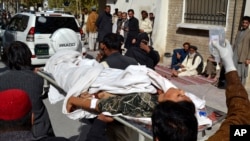Within the past two years, suspected religious fanatics have gunned down more than 65 polio vaccinators and policemen escorting the immunization teams in Pakistan.
The latest incident took place in the southwestern Baluchistan province on Wednesday, when gunmen attacked a team of polio vaccinators and then escaped.
The violence left four people dead, including three female health workers, while several others are undergoing treatment in a hospital in the provincial capital, Quetta.
A critically wounded female vaccinator, identified as Rubi, spoke to reporters shortly after the attack.
“We were nine women and a boy traveling in a group to participate in the immunization drive when two gunmen riding a motorcycle intercepted our vehicle," she said as she sobbed in pain. "They shot me first and then sprayed others sitting at the back with bullets. We kept screaming for help, but no one came to our rescue,” the woman added.
Gates foundation
Masood Khan Jogezai is the Baluchistan representative for the Bill and Melinda Gates Foundation, one of several foreign donors providing funds for Pakistan’s anti-polio efforts.
Jogezai said a security gap led to the killing of the polio workers.
“Definitely there was a security gap in the operational plan. The security people must have come to one of the areas, which is called the basic health unit, they should have come there, but they did not come,” he said.
Wednesday’s attack forced authorities to suspend door-to-door immunization of children in the province and confined the campaign to government-run basic health units under tight security.
Pakistan is scrambling to contain a polio outbreak that has recorded about 260 new infections so far this year. That puts Pakistan on pace to triple the number of cases recorded in 2013.
Jogezai said the violence has further shaken confidence of health workers and volunteers, challenging the campaign to eradicate polio.
“Definitely, it dented the program a lot and for the coming days will be facing [problems such as the] involvement of polio volunteers and the lady health workers to play their good role at the field level at the house-to-house campaign,” he said.
Officials at another donor group, Rotary International, are also upset at the Pakistani government’s inability to protect polio workers.
Security concerns
Aziz Memon, Rotary International Pakistan PolioPlus chair, said they raised the security issue in meetings with Prime Minister Nawaz Sharif and his health advisers. But the security situation continues to be a major concern, with more deaths of workers who are critical to the campaign’s success.
“These poor people, they come out on the street to do a noble cause to save the children from this crippling disease and they get 250 rupees, 500 or maximum 750,” said Memon. “You are talking of two-and-a-half to five dollars a day and that also they have to give their lives. It is sad and we cannot continue supporting the government [if they do not stop these incidents]."
Memon said that every time violence occurs against polio workers, few police or other officials are suspended or otherwise held accountable. And authorities have not properly investigated to determine the culprits behind the attacks.
Pakistani officials insisted a fake vaccination campaign run by Pakistani doctor Shakeel Afridi has led to the attacks on polio teams.
Afridi’s fake hepatitis vaccination campaign helped the CIA locate and kill terror mastermind Osama bin Laden in 2011. An anti-terror court sentenced Afridi to 33 years in prison.
“All those stories of Shakeel Afridi and this and that have all withered out, [a] long time has passed,” Memon said. “Now it is just a question of the authority. They are challenging the authority of the government.”
Elias Durry, the World Health Organization’s polio emergency coordinator for Pakistan, said, “It is not only frustration and we hope that we really all come together to get rid of the disease.
“The solution of all these problems is to finish the job," Durry said. "We all must learn from what happened and go forward so that this menace can be once for all eliminated and there is no chance for any other vaccinator to be shot at the way these heroes, heroines were shot a few days ago.”
Despite the killings and setbacks, Durry said he feels confident that Pakistan is now better placed to eliminate polio virus from the country because, unlike previous years, children in insurgency-hit districts are now accessible for vaccination campaigns against the crippling disease.
He cited counter-militancy operations underway like the one in volatile North Waziristan.
At a time of increasing concern over Pakistan’s inability to stem new polio infections, federal authorities declined requests to publicly defend the country’s polio strategy.
That has added to criticism of the country’s beleaguered Sharif, who has been seen as favoring mega projects worth billions of dollars, such as expanding the networks of motorways without first improving an ailing education and health sector.




